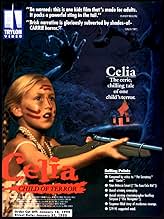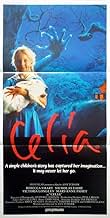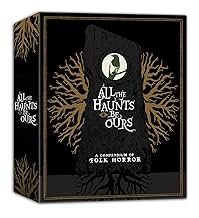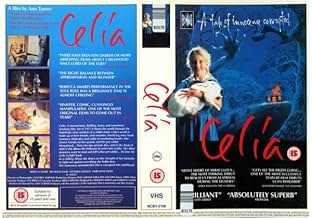IMDb RATING
6.8/10
1.7K
YOUR RATING
An imaginative and somewhat disturbed young girl fantasizes about evil creatures and other oddities to mask her insecurities while growing up in rural Australia.An imaginative and somewhat disturbed young girl fantasizes about evil creatures and other oddities to mask her insecurities while growing up in rural Australia.An imaginative and somewhat disturbed young girl fantasizes about evil creatures and other oddities to mask her insecurities while growing up in rural Australia.
- Awards
- 2 wins & 2 nominations total
- Director
- Writer
- All cast & crew
- Production, box office & more at IMDbPro
Featured reviews
This strange little movie from the land Down Under is really two movies, one of which definitely works, but the other not so much. On one hand, it is a fairly realistic portrait of rural Australia in the 1950's that was dealing with both a plague of rabbits and of Communists. In retrospect, the wild rabbits had a far better chance of over-running conservative Australia than the commies, but the wars on both these "plagues" were somewhat similar in that, as well-intentioned as they may have been, a lot of innocents were caught in the crossfire. "Celia", the young heroine of this film, for instance, has recently lost her Communist grandmother and loses her only friends due to their parents ties to the Australian CP. The fateful blow,however, comes when she loses her beloved pet rabbit "Murgatroyd" to the authorities.
"Celia" is portrayed as having a rich fantasy life that leaves her disturbed and even dangerously disconnected from reality (not unlike the two young girls in the later Peter Jackson kiwi film "Heavenly Creatures"). However, the movie does not focus on this dark fantasy aspect nearly enough, and "Celia" is portrayed as a rather ordinary and, moreover, very sympathetic young girl, which makes the one scene of real-life violence that occurs (actually, it is left a little ambiguous) not very believable. It also doesn't help, as others have said, that in America they seized on the under-developed and unbelievable aspects by trying to market this as a horror movie. This is not quite as good as Peter Weir's famous Aussie film "Picnic at Hanging Rock", but like that movie it has been mis-categorized as a horror movie, and no doubt will disappoint fans of gory, visceral horror, while scaring away a lot of the foreign/art-film enthusiasts that might enjoy it. I actually like both horror and art films, but this is definitely mostly the latter. It would make a good double bill with "Picnic" or "Heavenly Creatures"--or, even better, the weird 1970's indie American film "The Orphan".
It is definitely very well made and the acting is excellent, especially the young Rebecca Smart (child actors in Commonwealth always seem to be far, far better actors than the cloying, "adorable" moppets Hollywood always insists on casting in their saccharine kiddie crap). Check it out if you get a chance.
"Celia" is portrayed as having a rich fantasy life that leaves her disturbed and even dangerously disconnected from reality (not unlike the two young girls in the later Peter Jackson kiwi film "Heavenly Creatures"). However, the movie does not focus on this dark fantasy aspect nearly enough, and "Celia" is portrayed as a rather ordinary and, moreover, very sympathetic young girl, which makes the one scene of real-life violence that occurs (actually, it is left a little ambiguous) not very believable. It also doesn't help, as others have said, that in America they seized on the under-developed and unbelievable aspects by trying to market this as a horror movie. This is not quite as good as Peter Weir's famous Aussie film "Picnic at Hanging Rock", but like that movie it has been mis-categorized as a horror movie, and no doubt will disappoint fans of gory, visceral horror, while scaring away a lot of the foreign/art-film enthusiasts that might enjoy it. I actually like both horror and art films, but this is definitely mostly the latter. It would make a good double bill with "Picnic" or "Heavenly Creatures"--or, even better, the weird 1970's indie American film "The Orphan".
It is definitely very well made and the acting is excellent, especially the young Rebecca Smart (child actors in Commonwealth always seem to be far, far better actors than the cloying, "adorable" moppets Hollywood always insists on casting in their saccharine kiddie crap). Check it out if you get a chance.
Celia is a 9 year old girl with a lot of imagination. She lives with her family in South Australia in the fifties. She has a strong will, lots of charm and wit. Her family are communists, which makes them kind of outcasts in the society, and Celia has to fight mobbing schoolmates as well as discriminating teachers. She manages to do that very well. All this gives a rather frank and funny description of childhood problems, and Rebecca Smart plays her part extremely well. But Celia is not just a charming kid - when she hates, she really hates. And when she fantasizes about mysterious evil animals, she can't quite distinguish fantasy from reality. Which might seem rather normal, but Celia lives in a house, where a loaded gun is available... This movie is very entertaining, giving a varied picture of growing-up - and one can really feel the emotions and confusions, which is a part of being nine years old. At times the film becomes perhaps a bit too confusing - it can be quite difficult to follow the girls vivid imagination. But I'll guess, you have the same problem in the real world...
Celia is a spirited 9 year old girl with a vivid imagination.
Reeling from the death of her beloved grandmother, she seeks out the company of her new neighbours, The Tanners - a warm and loving family harbouring a secret.
Set in an Australian suburb in the late 1950's, the film tackles the prevailing social issues of the time including the "red scare" and the "rabbit pestilence", drawing a parallel between the two.
The film is essentially a drama, but with an added element of dark fantasy (which, although an interesting idea, is used inconsistently and often feels out of place).
But as a coming of age story, Celia is a triumph - an honest and unvarnished exploration of the trials and tribulations of childhood, featuring an astonishing performance by Rebecca Smart in the titular role.
Reeling from the death of her beloved grandmother, she seeks out the company of her new neighbours, The Tanners - a warm and loving family harbouring a secret.
Set in an Australian suburb in the late 1950's, the film tackles the prevailing social issues of the time including the "red scare" and the "rabbit pestilence", drawing a parallel between the two.
The film is essentially a drama, but with an added element of dark fantasy (which, although an interesting idea, is used inconsistently and often feels out of place).
But as a coming of age story, Celia is a triumph - an honest and unvarnished exploration of the trials and tribulations of childhood, featuring an astonishing performance by Rebecca Smart in the titular role.
In summer, 2003, I took a class about Australian cinema. We watched films like "Walkabout", "Gallipoli" and "Rabbit-Proof Fence"; it might have thrown a wrench in the works had we watched "Celia". At the video/DVD store, I found it under the horror section, but it's only a horror flick in the loosest terms. The movie deals with a nine-year-old girl (Rebecca Smart) in 1950s Australia whose amorality and alienation from society drive her to complete madness; I think that that was the plot. Certainly it's ugly what Celia does, but seeing what the adults around her are like, I felt that I had no choice except to root for Celia.
The historical context involves the Cold War and the government's efforts to stop the rabbit infestation. As people tell Celia not to fraternize with children of communists, she grows more and more disenchanted with the world around her - after all, friends are supposed to be friends no matter what the parents' political activity. But when a cop takes away her pet rabbit, she really gets nasty (it also shows that the rabbit-proof fence that lent its name to the 2002 movie clearly didn't work in holding back the leporid plague).
So how to interpret this movie? It looks at face value like one of the many instances of a seemingly cute girl having a not so cute side (think "The Bad Seed"). One might say that the rabbits play a role similar to the ones in "Night of the Lepus" and "Donnie Darko", even though Celia's rabbit doesn't do anything. I guess that it's worth seeing, if only once.
The historical context involves the Cold War and the government's efforts to stop the rabbit infestation. As people tell Celia not to fraternize with children of communists, she grows more and more disenchanted with the world around her - after all, friends are supposed to be friends no matter what the parents' political activity. But when a cop takes away her pet rabbit, she really gets nasty (it also shows that the rabbit-proof fence that lent its name to the 2002 movie clearly didn't work in holding back the leporid plague).
So how to interpret this movie? It looks at face value like one of the many instances of a seemingly cute girl having a not so cute side (think "The Bad Seed"). One might say that the rabbits play a role similar to the ones in "Night of the Lepus" and "Donnie Darko", even though Celia's rabbit doesn't do anything. I guess that it's worth seeing, if only once.
CELIA is an interesting film. Set in the 1950s, during the big, Australian rabbit plague, it's about the little girl of the title (Rebecca Smart), who has difficulty with a group of kids in her school. When a new family moves in nearby, Celia befriends the children. Trouble brews when she discovers that her pet rabbit has been taken away due to a recent edict.
With this movie, it's all about the finale, which is quite an unexpected shocker. It packs a punch, and turns what was mostly a drama with political aspects, into a horror story. Ms. Smart is exceptional in her highly-imaginative / disturbed role.
A one-of-a-kind gem...
With this movie, it's all about the finale, which is quite an unexpected shocker. It packs a punch, and turns what was mostly a drama with political aspects, into a horror story. Ms. Smart is exceptional in her highly-imaginative / disturbed role.
A one-of-a-kind gem...
Did you know
- TriviaThe fairy tale from which extracts were recited in the film was The Hobyahs by James H. Fassett and Robert D. San Souci.
- GoofsThe burn mark on Celia's rabbit is missing at the fishing docks.
- How long is Celia?Powered by Alexa
Details
- Release date
- Country of origin
- Official sites
- Language
- Also known as
- Celia: Child of Terror
- Filming locations
- Production company
- See more company credits at IMDbPro
- Runtime
- 1h 43m(103 min)
- Sound mix
- Aspect ratio
- 1.85 : 1
Contribute to this page
Suggest an edit or add missing content




























